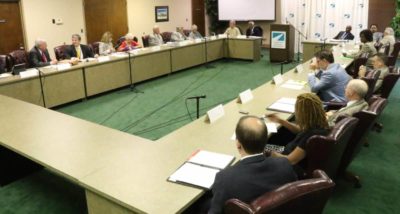After a contentious debate, the Achievement School District (ASD) bill passed its second and third reading in the House yesterday. It will now move onto the Senate.
The vote on second reading was 60-49. The third reading was a simple voice vote.
“Why anybody would stand up and argue for the status quo is beyond me,” said Rep. Cecil Brockman, D-Guilford, one of the sponsors of the bill. “We cannot afford to continue to do the same thing we have always done,”
The bill, the brainchild of Rep. Rob Bryan, R-Mecklenburg, consists of three programs, all of which are designed to help turn around low-achieving schools.
The Achievement School District portion of the bill would allow a pilot program that would take five of the state’s lowest-performing schools and put them into a state-run ASD headed by a superintendent of the State Board of Education’s choosing. The SBE would also have the power to possibly choose for-profit charter operators to run the schools.
The bill would also bring Innovation Zones to the state. Innovation Zones are similar to the Achievement School Districts in the sense that they allow the schools within them to have charter-like flexibility. However, these schools would continue to be run by their public school districts rather than charter operators. Under the bill, a 5-school Innovation Zone will be started in Charlotte-Mecklenburg Schools made up of Project LIFT and Beacon Initiative Schools. Then, any district that ends up turning over a school to the Achievement School District has the option of also turning three of its other continually low-performing schools into an Innovation Zone. Finally, the bill allows the State Board of Education to take applications for a three-year pilot from up to two local boards of education to create a three-school Innovation Zone for low-performing schools. The districts awarded those applications would not have to have turned over a school to the ASD.
A third part of the bill would allow the State Board to allow up to five continually low-performing schools around the state to implement a principal turnaround model. In this model, a local board of education replaces the principal of a school with one who has a proven track record of being able to turn around a low-performing school.
Lawmakers made passionate arguments both for and against the bill during the debate. Brockman said that two-thirds of African-American students in traditional public schools are not achieving on grade level, and he used this statistic to challenge lawmakers on their education priorities.
“If the majority was two thirds failing in this state, it would be an outright crisis,” he said. “We would be doing everything that we could.”
He also brushed aside concerns about the bill coming from teachers, superintendents, and local school districts.
“This bill is not about teachers. It’s not about principals. It’s not about LEAs. So if they don’t like it, good,” he said, adding later: “Who cares about the teachers? We should care about the kids. That’s what this bill is about.”
In response to questions from fellow lawmakers as to what he meant, he clarified that he’s not against teachers, but that lawmakers needed to be concerned about the kids in low-performing schools.
Rep. Rosa Gill, D-Wake, on the other hand, said that we already have a great public education system and that the state’s teachers are working against the odds to teach children who have a host of issues they bring into school, including social, emotional, and even psychological needs.
She said the General Assembly has a history of knee-jerk reactions and that this bill is one of them.
“When we hear something, all of a sudden we think it’s bad and we can find the answer,” she said.
Rep. Craig Horn, R-Union, disagreed with the characterization of this bill as a knee-jerk reaction.
“This bill proposes a very deliberate and somewhat lengthy period in order to address the issue,” he said.
He added that it gives schools the flexibility they need, and that teachers and principals want, to improve outcomes for their students.
Rep. Henry Michaux, D-Durham, echoed Gill’s sentiment that this bill is another in a long line of “fixes” that isn’t going to go anywhere.
“It’s just been one continuous mess after the other,” he said.
He also challenged Bryan to name a dollar figure for the bill. Bryan said it would cost somewhere around $1 million.
Rep. Michael Speciale, R-Craven, challenged lawmakers who said the state has no way of knowing if this bill would actually accomplish its goal.
“I’ve heard we’ve tried other things that didn’t work,” he said. “Well of course we’ve tried things that didn’t work…we don’t know if they’re going to work until we try them.”
Rep. Bobbie Richardson, D-Franklin, pointed out that the Department of Public Instruction’s District and School Transformation division has been showing success in turning around low-performing schools. However, she said it only has the funding to tackle 75 of the state’s 581 low-performing schools at the moment.
“We’re not funding them to do what they do best,” she said.
Rep. Bryan pushed back against lawmakers who said that the evidence shows that Achievement School Districts haven’t worked in other states.
Research presented to the House Select Committee that originally investigated ASDs indicated that, so far, they have not been successful in neighboring Tennessee, a state N.C. lawmakers looked to when considering this pilot. However, the research had more favorable things to say about Innovation Zones. One of the researchers who presented to the House Select Committee also speculated that the comparable success of Innovation Zones might be due to the threat presented to local districts by the ASDs.
Bryan said that this bill is being tailored to North Carolina’s issues and needs, and so a comparison between it and what is happening in other states isn’t exactly apropos.
“Whatever you may have heard positively or negatively…the program we are creating is unique to our state,” he said.
High School Math Common Core Revisions
While the House debated Achievement School Districts, the State Board of Education was voting through revisions to the High School Math Common Core Standards.
The changes are in high school courses Math I, II, and III, which will now be called Math 1, 2, and 3. The standards were revised to make them easier to understand, more rigorous, and to make sure the standards are appropriately placed in the courses. As a result some standards have moved from one course to another. See our previous coverage on the changes for more detail here.
The State Board’s move was not universally appreciated, however. Wednesday, during the Senate Education/Higher Education Committee, Sen. Jerry Tillman, R-Randolph, introduced legislation that would return the current integrated math sequence to the prior sequence: Algebra I, Geometry, Algebra II.
That was a preliminary recommendation of the Academic Standards Review Commission, though, controversially, that recommendation did not make it into the Commission’s final report. See our coverage of their suggested standards changes here.
Lynn Bonner of the News & Observer tweeted yesterday that Tillman introduced the bill on the same day the State Board was discussing the revisions on purpose.
NC St8 Bd of Ed to vote today on new high school math. Sen. Tillman says bill is "a very clear signal" to the board. #nced #ncga
— Lynn Bonner (@Lynn_Bonner) June 1, 2016
Mark Johnson, a Republican running against Superintendent June Atkinson for her position, sent out an e-mail response to the high school math revisions yesterday, criticizing Atkinson.
“Leadership is about proactively addressing problems, but all Superintendent June Atkinson ever does is react. After 40 years at DPI, Superintendent Atkinson is reacting to the problems that she created: over-testing, an F rating for teacher screenings, and a backlog of thousands of teachers being underpaid while waiting on their licenses,” he said. “The challenges of Common Core are more of the same from Superintendent Atkinson. More of the same cannot be the only option for NC students and educators.”
Trey Ferguson, a math teacher at Leesville Road High School in Raleigh, member of N.C. Core Advocates — a group of Common Core advocates from around the state — and board member of the Professional Educator’s of N.C. (PENC), argued in an e-mail interview against Tillman’s bill. He said that moving away from integrated math is a bad idea.
“I understand the handful of parent concerns over these standards, but I would say to them we are seeing an improvement and change takes time,” he said. “As educators, we do not need another ‘big change.’ We need the time and proper resources to implement the first major change.”
He added that “PENC’s position on the integrated approach to mathematics is that educators need consistency and have invested time, energy, and resources to effectively implement rigorous standards supporting all N.C. students.”



